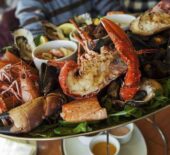The body is an amazing network which is constantly working to keep us healthy and what we eat influences how efficiently it runs. Just like a car with each component important to optimal function the vitamins each play a vital role in keeping the body being the optimal working machine.
This article focuses on the fat soluble vitamins A, D, E and K, these vitamins require fat to be taken in and used by the body. These vitamins are stored mostly in the liver and unlike the water soluble vitamins, excess is not eliminated when we urinate. This also means excess can be more harmful and why adequate rather than excess is the goal.
So where can we find these fat soluble vitamins? Let’s break it down:
Vitamin A
Also known as retinol from animal sources or carotenoids found in vegetable sources, which are then broken down into retinol.
Vitamin A helps:
- The body maintain immunity and fight colds, the flu and nasties we catch.
- Allows the eyes to see better in the dark
- Promotes healthy skin
- One factor which allows children to grow normally.
Where can we find vitamin A in high amounts as retinol?
- Liver
- Pate
- Kangaroo
- Oily fish (like salmon)
- Egg yolk
- Ghee
- Butter and margarine spreads
- Brie and camembert cheeses
What about carotenoids?
- Carrots
- Spinach
- Pumpkin
- Rocket
- Apricots
- Mango
- Kale
- Chilli (dried)
- Sun-dried tomato
How much do I need?
Men over 18 years need9 00 micrograms or 3,000 international units and women 700 micrograms or 2,300 international units.
Vitamin D
Benefits of vitamin D:
- Strong bones and teeth.
- Works with calcium to allow it to be absorbed in the body.
- Promotes normal cell division, their growth and how the cells develop in the body.
How much do men need?
Men and women aged 19-50 years need 5 micrograms a day. Generally we need to expose at least 15% of the body to the sun for 6-8 minutes in summer and more in winter to 26-28 minutes at around 10am to get the amount of vitamin D we need.
Vitamin D can be found in a few foods which include:
- Oily fish
- Fish oil tablets
- Butter
- Milk
- Egg yolk
- Cheese
Vitamin E
Vitamin E, like the other fat soluble vitamins, have important roles which include:
- Antioxidant capacity aka help keeping the body healthy.
- Prevents vitamin A and polyunsaturated fats (healthy fat type) from breaking down.
- The cells have a wall which is made up of fat, vitamin E helps make this wall stable.
- Allows the body to use vitamin K.
- Assists in making red blood cells.
What foods can vitamin E be found?
- Seeds
- Oils: Olive oil, Sunflower oil, Safflower oil and Canola Oil.
- Nuts
- Eggs
- Oily fish (like salmon and mackerel)
- Tahini
- Margarine which is made from polyunsaturated fats from seeds
How much do men need?
Men over 14 years need 10 milligrams or 15 international units and women over 19 years need 7 milligrams or 10 international units. This can be achieved by a handful (30g) of nuts, or two eggs with breakfast with wholegrain toast or a salmon fillet (100g) at lunch or dinner or a tablespoon of sunflower oil.
Vitamin K
This vitamin is essential for life as it:
- Helps the blood clot by assisting in making the proteins which do this.
- Protects the bones from breaking
- Helps the arteries stay healthy by playing a role in preventing them from calcifying.
Foods with high amounts of vitamin K include:
- Green vegetables
- Berries
- Dried herbs
- Lettuce
- Liver
- Eggs
- Cheese
- Wholemeal flower and bread
- Kelp (seaweed)
How much do men need?
Men over 18 need 70 micrograms and women need 60 micrograms, which can be achieved by eating 2-3 florets of broccoli with lunch or dinner, a large salad with lots of green leafy vegetables, pack a cup of nuts to have as morning and afternoon tea or include a cup of spinach and carrot with dinner.
References:
- National H, Medical Research C, New Zealand. Ministry of H, Australia. Dept. of H, Ageing. Nutrient reference values for Australia and New Zealand: including recommended dietary intakes. Canberra, A.C.T: National Health and Medical Research Council, 2006 9781864962376;9781864962437;1864962437;1864962372; Contract No.: Report.
- Diamond TH, Eisman JA, Mason RS, Nowson CA, Working Group of the A, New Zealand B, et al. Vitamin D and adult bone health in Australia and New Zealand: a position statement. The Medical journal of Australia. 2005;182(6):281.
- Saxalbey C. The role of vitamins in a healthy diet Australia: Foodwatch Australia; 2016 [updated June 2016; cited 2016 13/09/2016]. Available from: http://foodwatch.createsend1.com/t/ViewEmail/j/BB994BA0755FA75C.
- Johnson EJ, Mohn ES. Fat-soluble vitamins. World review of nutrition and dietetics U6 - ctx_ver=Z3988-2004&ctx_enc=info%3Aofi%2Fenc%3AUTF-8&rfr_id=info%3Asid%2Fsummonserialssolutionscom&rft_val_fmt=info%3Aofi%2Ffmt%3Akev%3Amtx%3Ajournal&rftgenre=article&rftatitle=Fat-soluble+vitamins&rftjtitle=World+review+of+nutrition+and+dietetics&rftau=Johnson%2C+Elizabeth+J&rftau=Mohn%2C+Emily+S&rftdate=2015-01-01&rfteissn=1662-3975&rftvolume=111&rftspage=38&rft_id=info%3Apmid%2F25418387&rft_id=info%3Apmid%2F25418387&rftexternalDocID=25418387¶mdict=en-US U7 - Journal Article. 2015;111:38.








